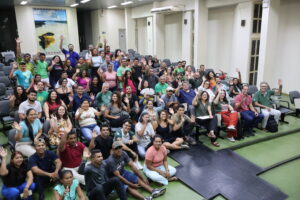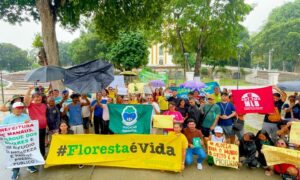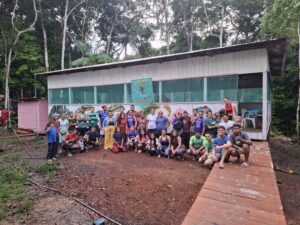18-month multinational research program will expand collaborative networks and address shared priorities in the Amazon Basin
João Vitor Campos-Silva has been selected as one of sixteen inaugural scholars to participate in Fulbright Amazonia, a new initiative to support cutting-edge research and cross-sector collaboration on Amazon Basin issues. A program of the U.S. Department of State, Fulbright Amazonia is supported in collaboration with the Fulbright Commission in Brazil and other Fulbright partners in the region.
This initiative will bring together applied researchers from Brazil, Bolivia, Colombia, Ecuador, Guyana, Peru, Suriname, the United States, and Venezuela to collaborate on action-oriented research with the goal of securing a sustainable Amazon Basin. Working in inter-disciplinary and multinational research teams, the inaugural group of sixteen Fulbright Amazonia Scholars will explore socially relevant research questions and participate in group seminars and exchanges to recommend actionable policies that directly improve the quality of life of communities throughout the Amazon Basin. Two notable Amazonia experts, Dr. Carlos Valério Aguiar Gomes, from the Federal University of Pará, Brazil, and Dr. Jeffrey Hoelle, from University of California, Santa Barbara, United States, will provide intellectual leadership to the group.
Campos-Silva is a Brazilian researcher and President of Instituto Juruá, an applied science organization created to work closely with local people and social movements. He is an associate researcher at several universities in Brazil, including Instituto Nacional de Pesquisas da Amazonia, Universidade Federal de Alagoas, and Universidade Federal do Amazonas. Among his research interests is co-designing an Amazonian Bioeconomy concept through Sustainable and socially fair fisheries. He has been working with research and conservation in Amazonia over the last 15 years with a focus on social-ecological systems and the human dimension within conservation. His areas of focus include fishery management, biodiversity-based value chains, sustainability, ecology, Amazonian bioeconomy, environmental governance, and community-based conservation. He believes that conservation solutions working toward a socially fairer and sustainable future for Amazonia should be co-designed with indigenous people and local communities, considering knowledge systems beyond science and ensuring social justice and popular participation in all processes.
His Fulbright Amazonia research will assess the community-based conservation of the giant arapaima to answer important questions regarding the Amazonian bioeconomy, in partnership with local communities. He will explore the impact of those biodiversity-based value chains on the wellbeing of indigenous people and local communities and the contribution of wild-managed fish as an alternative to beef on reducing greenhouse gas (GHG) emissions. He also plans to focus on the main social, cultural, and institutional ingredients ensuring the success of bioeconomy projects, and how the arapaima fishery can inspire an Amazonian concept for Bioeconomy taking into account the social and cultural complexity of this important biome.
Fulbright Amazonia will build on existing networks and close collaboration among U.S. and Amazonian universities and research centers to promote innovative approaches that preserve Amazonian social and ecological health and community traditions. Fulbright Amazonia Scholars will focus their research on the following thematic areas:
- Climate Change Adaptation and Mitigation
- Strengthening Human and Environmental Health and Security
- Bioeconomy and Sustainable Development
The scholars will each participate in an individual research exchange visit of six weeks to three months, as well as in-person seminars and ongoing virtual meetings to address public policy and other applied research questions relevant to Amazonian nations’ shared opportunities and challenges. Fulbright Amazonia activities will begin in June 2023 with a meeting in Belem, Brazil, that will include Amazon stakeholders. An interim meeting will be held in Colombia halfway through the program. In December 2024, Fulbright Amazonia scholars will convene in Washington, D.C. to present their final policy recommendations.
The sixteen scholars from the United States and the Amazonia region were selected through an open, merit-based competition to work across borders to conduct multi-disciplinary research to inform environmental protection, conservation, mitigation, and adaptation priorities and practices. Meet the Fulbright Amazonia Scholars and Co-Lead Scholars.
Fulbright Amazonia is part of the Fulbright Program, the U.S. government’s flagship international educational exchange program, which is funded through an annual appropriation made by the U.S. Congress to the U.S. Department of State’s Bureau of Educational and Cultural Affairs. Participating governments and host institutions, corporations, and foundations around the world also provide direct and indirect support to the Program. Since 1946, the Fulbright Program has provided more than 400,000 participants from more than 160 countries with the opportunity to study, teach and conduct research, exchange ideas and contribute to finding solutions to shared international concerns.
Fulbright Amazonia is a program of the U.S. Department of State, Bureau of Educational and Cultural Affairs (ECA) with funding provided by the U.S. Government and the Fulbright Commission in Brazil (FBR), with the additional support of other binational Fulbright Commissions and U.S. Embassies in the Amazon region. The program is administered by the Institute of International Education. For further information about the Fulbright Program, please visit https://fulbrightprogram.org or contact the Bureau of Educational and Cultural Affairs Press Office at ECA-Press@state.gov.






